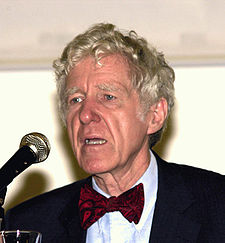 The Government’s new chief scientist, Sir Peter Gluckman, yesterday published an excellent overview of the scientific understanding of climate change and how that impacts on policy in New Zealand. It’s a notably calm and measured piece — about as far from “alarmism” as it’s possible to be. Discussing the consequences of a 3.3ºC increase in global temperature by the 2090’s, Gluckman describes them as “quite scary”:
The Government’s new chief scientist, Sir Peter Gluckman, yesterday published an excellent overview of the scientific understanding of climate change and how that impacts on policy in New Zealand. It’s a notably calm and measured piece — about as far from “alarmism” as it’s possible to be. Discussing the consequences of a 3.3ºC increase in global temperature by the 2090’s, Gluckman describes them as “quite scary”:
If the temperature rose by this amount then the scenarios become quite scary in terms of changes in climate, flooding of low-lying areas, new patterns of infectious disease, and reductions in the capacity of many parts of the world to support agriculture and therefore to support our continued existence as we know it. New Zealand would not be immune from these changes.
Others might prefer stronger language… but Sir Peter makes a number of telling points elsewhere. He likens those who oppose the mainstream scientific view on global warming to scientists who argued that AIDS was not a viral disease:
A similar debate occurred about AIDS, where a minority of scientists maintained for a long time that the disease was not caused by a virus. This view was manifestly wrong in the eyes of most scientists, but nevertheless some distinguished scientists, albeit usually not experts in virology, took different views until the science became irrefutable. The political consequences of this denialism had tragic results in some African countries.
Gluckman leaves the obvious corollary unspoken, so I hope he’ll forgive me for putting it into my own words: we can expect tragic results to flow from climate denial.
I’ll quote his final paragraph in full:
There is no easy answer -– the science is solid but absolute certainty will never exist. As part of the global community, New Zealand has to decide what economic costs it will bear and what changes in the way we live will be needed. We must be involved. This is a global challenge, and a country like ours that aspires to be respected as a leading innovative nation cannot afford to appear to be not fully involved. Indeed, such a perception would compromise our reputation and potential markets.
This is the advice John Key is receiving, and it’s good to see that Gluckman, while being measured and careful, is not underplaying the size of the problem or the role we should play. In fact, it might be possible to detect a mild rebuke for the government’s pusillanimous approach to emissions targets in the phrase we “cannot afford to appear to be not fully involved”. 10 – 20% is a long way from “fully involved”, I would argue.
Like this:
Like Loading...
 In a hard-hitting article in today’s New Zealand Medical Journal, a group of senior health professionals call for NZ to halve its greenhouse gas emissions by 2020. The spokesperson for the recently formed Climate and Health Group, Dr Alex Macmillan says:
In a hard-hitting article in today’s New Zealand Medical Journal, a group of senior health professionals call for NZ to halve its greenhouse gas emissions by 2020. The spokesperson for the recently formed Climate and Health Group, Dr Alex Macmillan says:
 Renowned American environmentalist
Renowned American environmentalist  Government ministers have deliberately played down the role of forestry in meeting emissions targets, documents released under the Official Information Act suggest.
Government ministers have deliberately played down the role of forestry in meeting emissions targets, documents released under the Official Information Act suggest.  The Government’s new chief scientist,
The Government’s new chief scientist,